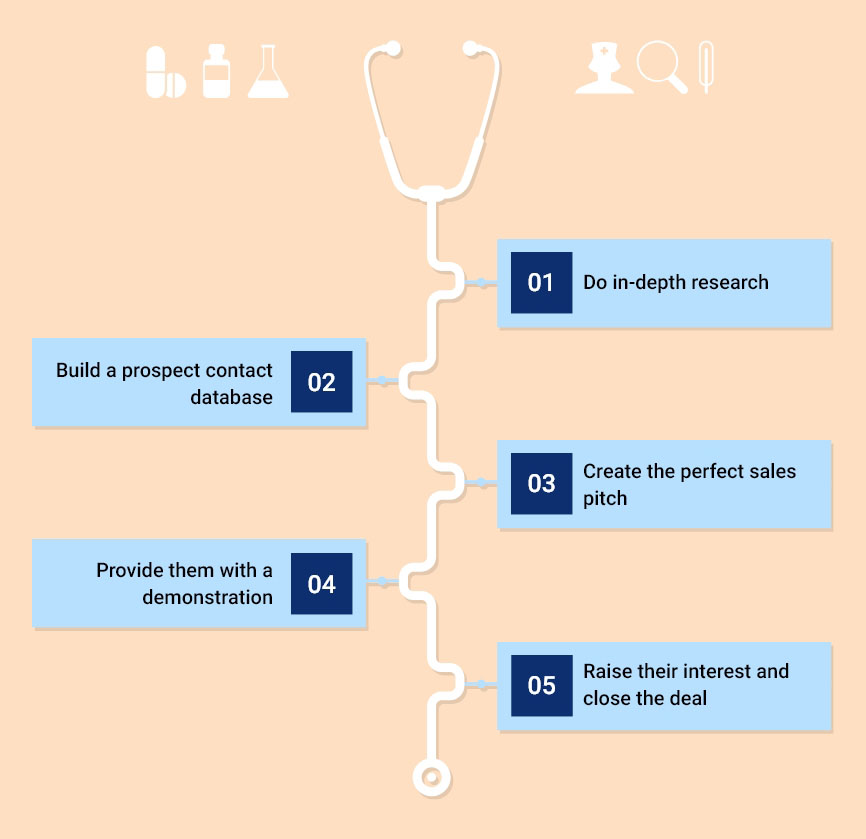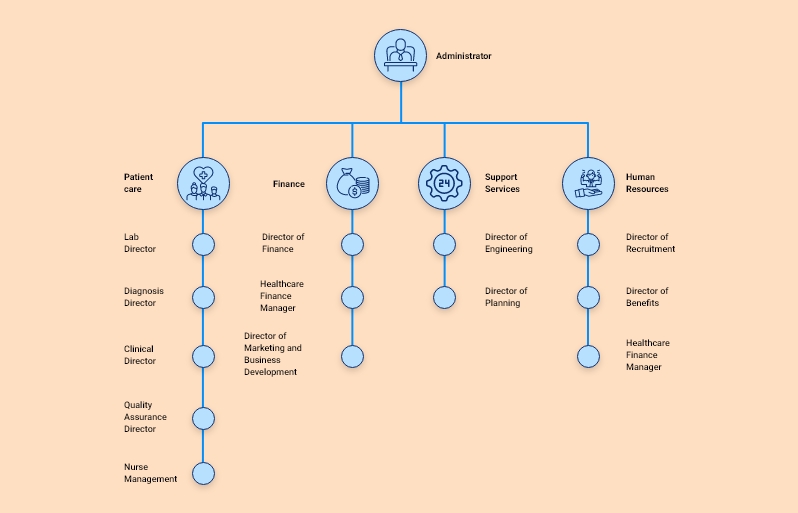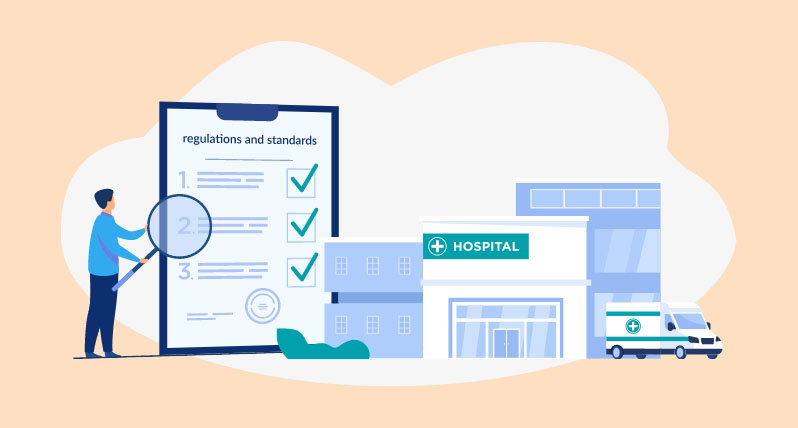Subscribe to Our Newsletter
Stay updated with the latest tips and strategies. Get additional discounts and alerts on offers.
Healthcare is arguably the largest B2B segment, therefore, it poses various challenges for marketers to sell their medical devices to their ideal customers. The industry has now evolved from hospitals, clinics, and pharmaceuticals to different aspects of wellness where doctors provide online services. A study done by Global Industry Analysts Inc. proved that the digital health industry is estimated to grow from $152 billion in 2020 to $456.9 billion by 2026.
Post COVID-19 pandemic, many hospitals maximized the efficiency and effectiveness of their services with the help of updated and more advanced resources, infrastructure, and high-quality technology. The healthcare industry brings unique challenges, such as tough competition, new technology being integrated with health services, regulatory changes, and staffing shortages, which make marketing to the healthcare industry a daunting process. In such a competitive market space, what does it take to become a preferred vendor among healthcare decision makers?
One thing to remember is that hospitals are consumers of various goods and services, such as beds, medical devices, diagnostic technology, medicines, and IT systems. They are among the top buyers of large equipment and soft goods. Selling your products/services to hospitals may require your company to be a qualified vendor that can evaluate the hospital’s needs and provide high-quality products.
Since this industry is constantly evolving, you need to adapt your sales strategies to get the best results and increase your profit margin. Therefore, we have compiled a list of strategies marketers can use to propel B2B businesses toward a growth trajectory. First, let’s start with the five steps to streamline your sales process for healthcare organizations.

The first step to a successful B2B sale has to be in-depth research on the hospital, its competitors, and the market space. This step is crucial to the sales process as it will aid the sales team in analyzing the pain points of a particular hospital and creating a customized sales pitch. The hospital comprises management/hospital administration, procurement staff, suppliers, doctors, and nurses, among others. Consequently, extensive research can help you find the right decision-makers and access a vast network of prospects.
This step requires your sales team to list down the decision-making authorities of healthcare organizations. Identify the target audience who will benefit from your products or services. Segment your audience based on large or smaller organizations and even region-specific groups. The sales team must aim to build connections for the C-level management if they are striving to connect with large healthcare organizations.
Smaller hospitals, clinics, and other wellness organizations work together to buy more significant volumes and negotiate for cost reduction. You need to find a single person or authoritative figure who will be responsible for making all the hospital decisions. Hence, it is not necessary for a marketer to only reach out to the founder or board of directors as general managers also play a key role in healthcare organizations. Building a contact database by yourself is a time-consuming process. Therefore, the sales teams can purchase a healthcare industry contact database that is verified, accurate, and constantly updated and instantly build connections with healthcare organizations. Some database providers also allow you to customize your database per your requirements.
Now that your team has done its research and built the prospect list. The next step is to create a great sales pitch for your sales representatives. It can be done in the form of traditional PowerPoint presentations, video pitches, or even infographics. No matter the chosen format, it must showcase the product’s benefits to the prospects. The sales pitch should clearly define the value proposition that you are offering to their business and their patients. Every sales pitch would be tailor made for the business it will be targeting, a pitch for a payer enrollment services firm would be drastically different from what would be used to approach a neurology medical billing company, considering the difference of niche and use case.
Since hospital executives are extremely busy people with packed schedules, your sales pitch must be able to grab their attention immediately. It must define your product’s value proposition and indicate how your products will solve their pain points. Explain the ways they can integrate the product or service into their existing infrastructure. Also, remember to add your contact information so that they can contact your sales team if they have any queries or are interested in your products.
In a hospital setting, there is little time for doctors or other healthcare executives to read long and detailed product manuals or attend seminars. Hence, it is vital to provide them with a product demo in the form of a short video. The demo must illustrate how your products can make their jobs easier. A demo usually includes the product’s or service’s highlights and features, but it would be beneficial if it contained feedback and reviews of successful sales.
It is also optional to showcase your product in action to help your prospects to develop an interest in your offering. One tactic that can be used to educate clients is to offer their healthcare clients a free pilot or trial period. It can be beneficial if you can train them with an online course if the product is a new technology. This way, your client will better understand your product or service and be more invested in purchasing it.
This step is about enhancing your customers’ knowledge about your product or service, developing their interest, and nurturing them until you close the deal. This can be done by keeping them updated on your latest products, such as blogs, or eBooks, sending newsletters, and exclusive discounts, among others. Create an eye-catching social media campaign to give them insights or ideas on how your products can solve their problems.
Market your product or services to hospitals creatively to gain the upper hand over your competitors. Personalize your campaigns to build a connection with the hospital or clinic staff. Lastly, have a conversation with the hospital’s Chief Information Officer (CIO) and try to negotiate a deal with them.
Looking to equip your marketing efforts with a healthcare database provider? We have you covered! Our data team ethically collates the healthcare industry contact databases from credible sources. Explore the wide variety of contacts and data quality.
One of the easiest ways to expand your audience is by promoting your products or services on B2B social media platforms like LinkedIn, Facebook, or Twitter. A study by Think Insights concluded more than 50% of healthcare administrators research vendors and products online, while 94% use the internet to research product features.
It is vital to experiment with different media, such as email marketing, trade publications, paid search, SEO, affiliate marketing, social media, telemarketing, review sites, and so on. A multichannel marketing approach will heighten your brand awareness and increase your customer base. Once the channels are chosen, you can test new ideas, track your campaigns, and improve them based on the insights you collect. Hospital administrators reach out to vendors after searching for products or services on Google. Hence, it can be beneficial to rank on the SERPs.
Content marketing is an effective strategy for establishing expertise, promoting brand awareness, and building connections with B2B prospects like medical professionals. Doctors find it challenging to keep track of every topic pertaining to healthcare and issues that the healthcare industry might face. This is where content marketing can come in handy. Providing informative and resourceful content in the form of blogs, whitepapers, eBooks, and case studies can aid you in earning their trust.
Offering valuable content can retain your target audience and bring a consistent flow of new healthcare industry leads into your pipeline. A well-planned content marketing campaign can increase credibility and visibility. The healthcare industry can be highly academic, so investing time in creating quality content that can prove your expertise to them and position your company as a thought leader is beneficial. It is a foolproof way of building strong relationships with the hospital staff, doctors, and the healthcare community.

When trying to sell your products to hospitals, it is vital to reach out to the right stakeholders as they are responsive in purchasing any product or service for the hospital. The first step to knowing the buying hierarchy is getting in touch with the healthcare network and identifying the decision-makers of the hospital or clinic. Most hospitals have an unclear organizational structure, which makes it challenging to find the person in power.
This is because managers and executives also work as doctors, while a chairperson can be an honorary title with little power to make purchasing decisions. Therefore, you can use the contact list you have built or buy a contact database segmented based on your requirements. It requires in-depth research because every hospital or clinic may or may not have a defined role. Once you find the right person to go to, set an appointment for a formal meeting.
A clinical product specialist is an expert in using medical devices or healthcare technology tools their company produces. Their main motive is to perform product demonstrations, describe its specifications to healthcare stakeholders and assist with product releases. They are very beneficial for building relationships between your company and healthcare decision-makers.
Healthcare buyers usually conduct deep research on the products they are interested in and may ask specific questions related to your products. A product expert can answer these questions and successfully close the deal. Convincing clients is challenging but having professionals who can precisely explain the benefits and features of your product and service will aid in developing trust and long-term relationships with healthcare organizations.

One of the essential tips for selling to hospitals and clinics is compliance with the regulatory guidelines, standards, and safeguards set by the healthcare industry. Not following or going against the rules can result in heavy fines and penalties. Therefore, it is crucial to follow the regulations if your products fall under Electronic Protected Health Information (ePHI).
The HIPAA (Health Insurance Portability and Accountability Act) regulations are one that every medical vendor must know about, as data breaches can lead to severe financial consequences. A healthcare provider should check if the products meet the hospital’s mandatory standards. Be aware of the medical regulations set in a particular area or state. The products and services must be of high quality and recognized by medical organizations, especially if you sell medical equipment or healthcare systems.
Account-based marketing (ABM) is an effective marketing strategy that focuses on utilizing resources on a set of target accounts within a market. This strategy is known to help build personalized campaigns for a particular group of hospitals specializing in one thing. ABM allows marketers to create marketing messages on the specific attributes of a clinic or hospital and close more deals. Many marketers are implementing ABM to demonstrate their products’ benefits and tailor their approach toward the type of hospital they are reaching out to
This process can be achieved by identifying the various target departments within a large organization. It is a known fact that ABM can hike your sales and revenue, but it is up to you to create an effective campaign. However, account-based marketing will work well if you have segmented your hospital or clinic based on their geographic placement, specialty, target audience, size of the healthcare organization, or even how they provide patient care.
When selling medical devices to a healthcare organization, building a connection with healthcare organizations is like winning only half the battle. The rest is determined by the quality of your product and the sales pitch, which your sales and marketing team achieve by coordinating together. Nurturing and converting those prospects require implementing the right strategies at the right time.
The strategies given above will boost your sales growth significantly. Selling services to hospitals comes with unique challenges but building the right connections can open a world of opportunities. Just remember to follow all the regulations set by the healthcare industry, and you are good to go.
At DataCaptive, we address all your B2B data requirements under one roof. With an 85% email deliverability rate and a 95%accuracy rate on the databases, you will be able to grow your business in no time!
The sales process of selling to a hospital are:
While purchasing a product or service, a hospital will always:
Selling to health centers requires you to follow strategies such as:
The best strategy for selling services to a hospital is building an online presence. This is because medical professionals are now less reliant on salespeople as they conduct their research online.
Show Some Love!

Subscribe to Our Newsletter
Stay updated with the latest tips and strategies. Get additional discounts and alerts on offers.
Related Articles
Subscribe to Newsletter
Stay up to date with the latest marketing, sales, and service tips and news.
Limited Time! Celebrate the spirit of freedom with 30% OFF on all B2B databases.
Unlock high-quality leads and drive your campaigns further with accurate, verified data trusted by thousands of businesses.
Don’t miss out—power up your marketing while the offer lasts!
